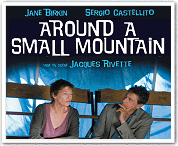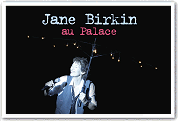Jane Birkin was born in London, she is the daughter of the beautiful actress Judy Campbell and David Birkin, an officer in the Royal Navy, who worked on clandestine operations as navigator with the French Resistance. She first went on stage at the age of 17 and met John Barry, the composer. 1965 she had been chosen to play in a musical comedy "Passion Flower Hotel". Music signed... John Barry ! They married shortly afterwards, and Kate Barry was born in 1967.
At the age of twenty, Jane attracted attention in "Blow-up", Antonioni's scandalous film that received the grand prix at the Cannes Film Festival. In France, Pierre Grimblat was filming Slogan and was looking for a girl to play opposite Serge Gainsbourg. The artist was already famous and was still grieving after his break up with Brigitte Bardot. Jane went for a screen test; she barely spoke French, knew nothing about her co-star, Gainsbourg gave the young girl a rough time, but when she burst into tears, mixing private sadness about John Barry and the film part, he disapproved, but he recognised that she cried well in front of the camera, and he, who could of vetoed the directors choice, agreed with him, and Jane got the part! And that was how their mythical love story began in Paris in 1969. They became inseparable and a living legend when they recorded "Je t'aime moi non plus". Censorship went wild, the Vatican banned it, the B.B.C refused to play the original, and did their own orchestral version, thanks to this the record sold a million copies in a matter of months! Off they went to Yugoslavia to play in Abraham Polonski's "Romance of a horse thief" with Yul Brynner and Eli Wallach... nine months later their daughter Charlotte was born, in 1971.
"Di Doo Dah", her first solo album, was released in 1973. This same year she proved herself as a film actress in J. Rouffio's "Sept morts sur ordonnance" with actors Depardieu and Piccoli. She also took part in the phenomenal box office and "grand public" success of "La moutarde me monte au nez" and "La course à l’échalotte", two Claude Zidi’s popular comic movies with Pierre Richard.
In 1975 Serge and Jane were back with "Je t'aime moi non plus", the film (an exploration of a homosexual theme heightened by the ambiguity of Jane, the androgynous muse.) Puritan France was outraged & the critics panned the film, but Francois Truffaut raved about it in "La masque et la plume" and since it's debut it has become a film legend, from France to Tokyo! "Lolita go home" came out in 1975. Jane sang Philippe Labro's lyrics set to Gainsbourg's music. In 1978, "Ex-fan des sixties" was released.
By 1983 Jane had left Serge. She was living with Jacques Doillon, with whom she had Lou, in 1982, her third daughter, Doillon was the actresses dream of director, imposing his own personal style of drama, and bringing out the very best of his actresses, the director of "La fille prodigue" and "La Pirate", imposed a decidedly dramatic style on this "light" actress and the critics were impressed..."La Pirate" was the official French entry for Cannes...
Gainsbourg, suffering from the separation, wrote "Baby alone in Babylone" for her (Charles Cross award)... gold record, Jane, a deeply moving interpreter of the writer's inner turmoil, became, from then on, to quote her, "his female side" his "fragile half", singing songs of pain and separation, sawing high with the heart breaking "Fuir le bonheur de peur qu'il ne se sauve", or "Dessous chics"...
Directors like Jacques Rivette and Agnes Varda, Tavernier, understood and used Jane's artistic sensitivity and in 1985, she made her début on stage, in a play by Mariveaux, she was the countess in "La Fausse suivante" under the great direction of Patrice Chéreau. From these experiences, she will take enough courage and self-confidence to get on stage as a singer, after the release of "Quoi" which was a smash hit by Gainsbourg, in 1987 Jane gives a show at the Bataclan, directed by Lerichomme, Jane cuts off her hair, takes singing lessons, dresses like a boy, and she did it "just wanting to impress Serge"... The show was an over night success, he was there most nights, and filmed her for "Printemps de Bourges" festival...
In 1990 Gainsbourg dedicated a new album to her: "Amours des feintes". It was to be the last. He died on 2 March 1991. A few days later, David Birkin also died. Jane was crushed, both her heroes gone in three days, when she appeared on stage at the Casino de Paris, the atmosphere was grave the emotion palpable, the whole of France was mourning their dead hero Gainsbourg, their loss was great, and Jane gave a little of him back in this communion, but after a non stop world tour, finishing at "La Rochelle", she put her microphone on the ground and walked away from the lights...
She returned to the intimacy of writing and devoted herself to what was dear to her: her family and her humanitarian work. She sang in particular on behalf of Amnesty International, made a short film for the battle against AIDS, and another for Amnesty International, then she made her own film "Oh pardon tu dormais" directed and written by herself, then threw herself into humanitarian causes, and went in a tank over the mount Igman, for "Paris Saryevo" taking supplies and literature into the besieged town Sarajevo.
Her fans, who were urging her to carry on 'singing Serge' to them, had their wish granted in 1996, the year of "Versions Jane", on which various artists like Goran Bregovic and the Senegalese percussionist Dudu N'Diaye Rose re orchestrated 15 tracks from the repertoire of Gainsbourg's youth. "La gadoue" and its spirited rhythm was a success, revamped by Les Négresses Vertes, thirty years after the original version.
In 1998 Jane recorded "A la légère". In this new venture, which she described as 'total infidelity', she invited 12 composers to write 12 original songs.
In 2002 Jane decided to defend in her own way Gainsbourg’s songs, under skies 'at the same time Algerian, Andalusian and gypsy'. She was delighted by the idea of introducing him as widely as possible to a young audience. This new show she called "Arabesque". Philippe Lerichomme, her artistic director and Gainsbourg's, advised her to work with the Algerian violinist Djamel Benyelles whose violin made Gainsbourg's songs vibrate to the tune of Arabic interludes. The show Arabesque will be played more than 400 times worldwide.
"Rendez-Vous", her album of duets with Françoise Hardy, Bryan Ferry, Etienne Daho, Brian Molko, Miossec and Beth Gibbons, was released in 2004. It was followed by "Fictions" in 2008 where she collaborated with authors such as Neil Hannon, Beth Gibbons, Rufus Wainwright, Arthur H, Dominique A...
After her return to the theatre as Electra by "Sophocles" from November 2006 to march 2007 (at Théâtre des Amandiers in Nanterre and in 15 other French cities), she has presented her second movie as a director and actor: "Boxes" with Michel Piccoli, Geraldine Chaplin, Maurice Bénichou, Tcheky Karyo, Natacha Régnier et Lou Doillon… at the Cannes Film Festival 2007 in the Official Selection (out of contest.)
After finishing Jacques Rivette’s last film "36 Vues Du Pic Saint Loup" with Sergio Castellito, Jane released in November 2008 her album "Enfants d’Hiver", featuring for the first time ever exclusively Birkin lyrics. In parallel, she continues her charities actions for paperless immigrants, the release of Aung San Suu Kyi and for the victims of the earthquakes in Haiti and recently in Japan. She also appears on stage next to the author, director and actor Wajdi Mouawad in "La Sentinelle", a play written for her.












